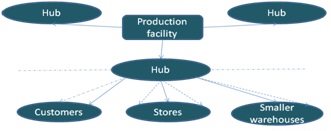Hub - Definition & Meaning
What is Hub?
In supply chain management, Hub refers to a central warehouse that’s used to cater various destinations that may be customers, stores or other smaller warehouses. It’s an important part of supply chain strategy and used to optimize the overall transportation costs. Hubs are generally placed at the places that are near to customers.
A production unit may not be near to its customers. In such cases, bigger warehouses are made near the customers in order to serve them at minimum cost and shorter lead time. The various benefits of the Hubs are as follows:
• Optimization of transportation cost
• Shorter lead time
• Enables implementation of Just in Time Delivery
• Reduction of in-plant inventory and allows level production
In Hubs, goods can be stored in orderly fashion and labeling or documentation can be easily performed. It enables use of modern technologies like RFID etc and reduces the possibility of rank A and B errors. It can also be used to maximize cross docking i.e. direct delivery to stores or customers and minimize costs.
The distribution strategy through hubs can be understood using diagram below:

Distribution system using Hub
This article has been researched & authored by the Business Concepts Team. It has been reviewed & published by the MBA Skool Team. The content on MBA Skool has been created for educational & academic purpose only.
Browse the definition and meaning of more similar terms. The Management Dictionary covers over 1800 business concepts from 5 categories.
Continue Reading:
What is MBA Skool?About Us
MBA Skool is a Knowledge Resource for Management Students, Aspirants & Professionals.
Business Courses
Quizzes & Skills
Quizzes test your expertise in business and Skill tests evaluate your management traits
Related Content
All Business Sections
Write for Us